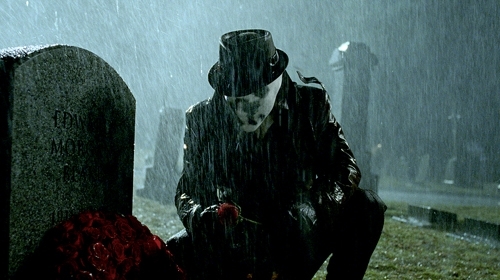Why do we punish? And why is it so much fun to see punishment doled out? From crime procedurals like Law and Order to superheroes dominating the box office in The Dark Knight Rises and The Avengers, we seem to have a collective fascination with the punishment of wrong-doers. But where does the urge to punish come from? Why are we so insistent that the wicked suffer? Because that’s the key question – punishment, but it’s very nature, is generally backwards looking. Punishing the murderer doesn’t bring back the dead. What good does it do anyone to inflict further suffering, even if it seems like someone “deserves” it? My colleague Matthew Belinkie has explored the legal side of punishment at length, so I’m going to turn my attention towards the extra-legal side of punishment – the vigilante.
In the real world, punishment is the exclusive domain of the state – finding and punishing wrong-doers is arguably what makes a government a government. Preventing individuals from enforcing the law themselves is a vitally important part of maintaining order. In pop culture, though, the vigilante is often seen as a viable – if not preferable – alternative to governmental punishment. There’s nothing we like more than to see one man, alone against the criminal underworld.

In two different long- running TV shows, Burn Notice and Dexter, audiences tune in week after week to see an attractive white male in his 30s run around Miami and take the law into his own hands. Both characters have deep seated psychological issues stemming from their fathers, have loose ties to the government, and will not stop narrating. This isn’t all accidental – both characters relationship with their fathers are indicative of the deeper ties between our fathers and punishment (See also: Batman, Superman, Iron Man, James Bond, etc.) The tropical setting provides a stark contrast to the darkness of the crimes being fought, and the constant narration keeps the audience rooting for the protagonist, even when his actions would normally have us dialing 911 and calling for them to get sent to the electric chair.
Dexter always kills his victims, while Michael Weston sometimes just scares them away or gets them arrested, but the two men are still fundamentally the same – they have both decided that the government is falling down on the job, and that justice demands they take the law into their own hands. What truly separates the two men is why they do what they do. To understand these two vigilantes and their appeal to the TV audience, we need to explore the reasons that anyone would want to punish someone in the first place.
“Peneology” is the field of criminology that deals with the philosophy of punishment. Peneological theories typically fall into four different categories – deterrence, rehabilitation, incapacitation and retribution. The first three can broadly be categorized as utilitarian theories of punishment – they argue that the benefits of punishing crime outweigh the costs, and is therefore justified.
Under deterrence, for example, the argument is that by punishing wrong-doers, you can deter other would-be criminals from committing crimes. Batman is the classic deterrent vigilante – he wears the cape and cowl in order to strike fear into the hearts of the criminals of Gotham. For each bad guy he beats up, two bad guys are deterred from committing the crime in the first place. While he’s often called on to prevent the schemes of Gotham’s super-villains, his real goal is creating fear – fear of breaking the law.

Incapacitation, by contrast, is more specifically targeted. Incapacitation theories argue that we punish criminals because in doing so we keep them away from the rest of society and prevent them from committing further crimes. While Batman plays this role to some extent, Superman fits this role a little better – his goal is generaly to prevent crimes from happening or to put the bad guys in jail after they’ve happened, but his job is generally to inspire hope, not fear.
Rehabilitation is the idea that by punishing criminals, we can get them to see the error of their ways and avoid committing crimes in the future. Perhaps understandably, there’s not really a pop culture rehabilitation vigilante – education and reform just don’t have the same allure as dropping bad guys off of buildings to get them to talk. (You might make the case that the forced confessions that ended pretty much every episode of The Pretender fit this model, but that’s another article). In any case, all three of these theories are based on the idea that by punishing a criminal, we produce some net good for society.
Retribution is an entirely different animal. Under a retributive theory, the wrong-doer is punished because they deserve to be punished. While the underlying morality differs across retributive justifications, the common thread is that there is some intrinsic good to punishment, independent of any benefit that accrues to society. Immanuel Kant uses this example:
“Even if a civil society resolved to dissolve itself with the consent of all its members—as might be supposed in the case of a people inhabiting an island resolving to separate and scatter themselves throughout the whole world—the last murderer lying in the prison ought to be executed before the resolution was carried out.”
To a retributivist, the punishment of evil is an end in and of itself – even if society gains no benefit, it is still worth doing. In pop culture, the clearest example of this theory is Rorschach from Watchmen. (Spoiler alert). Upon discovering the Ozymandias had destroyed Manhattan, he refuses to agree to go along with the coverup. Even knowing that exposing the crime could cause the end of the world, Rorschach is unwilling to excuse Veidt for his role in the destruction of New York – regardless of consequence, the crime must be punished.

So what separates Dexter and Michael Weston? What keeps them hitting the streets in search of the scum of Miami? Because they both narrate their stories, we can start with what they claim justifies what they do. Dexter claims to be a retributivist – he often says that his victims “deserve” to be under his knife. There’s no deterrence to be had when justice is done in secret, and there’s no rehabilitation to be had at the bottom of the Atlantic Ocean. Dexter kills serial killers because these people deserve to be killed. His motives for killing are supposedly the product of his “dark passenger,” but he is always careful to kill only those that truly deserve it.
Michael Weston, on the other hand, falls all over himself to disclaim any retributive goals. At the start of the “case of the week,” Michael always starts small. He always starts with a specific client and a specific problem to be solved. His goal is never to get to some abstract idea of justice or see that a bad guy is put in jail. When the kidnappers are threatening to kill the daughter of some poor sap that just happens to have met Sam at the bar, Michael’s goal is never to kill the kidnappers or see them put in jail for their crimes – his first advice is usually to just pay the ransom, or if there’s no money, to try and rescue the victim, even if the criminals get away. Punishment qua punishment is never part of the plan.
These narrated justifications, though, only go so far. Dexter supposedly works by a “Code”, but the truth is that he kills because he likes killing. The claim that someone “deserves” to be cut up into little pieces and put into trash bags is really just bloody-mindedness. In this light, retribution is just revenge with a prettier name. Dexter is the reflection of our worst suspicions about punishment and the justice system in general – that all of our fancy “Codes” aside, we’re no better than Dexter and his plastic wrap.

For Michael Weston, who always claims that he just wants to “get in and get out” of whatever problem he’s in, his solution typically involves explosions and creating mayhem across the city. It’s all supposedly in the name of a greater good – but we’re never shown the costs. We never see the firefighters that have to come put out the fires, or the innocent bystanders hit by stray rounds of the firefight. Kant opposed punishment on utilitarian grounds because it used people as the means to an end – and once punishment becomes decoupled from justice, literally anything can be justified. Once Michael decides that he needs to blow up a car or stage a kidnapping to accomplish his goal, he’s off to the races, the police and society be damned.

For “The Greater Good”
There’s one more layer to unpack though. Most people don’t think “I’m a retributivist” or “I’m a utilitarian,” and they certainly don’t worry about it when they’re watching TV. We can have more than one goal behind what we do – you can punish both because it’s good to punish and because punishment does good. Our vigilantes, then, are almost always forced into fulfilling both of those goals. The fictional universe conspires to ensure that Michael’s explosions don’t hurt innocent bystanders, and that our serial-killer-killer is always also benefiting society. We don’t root for Dexter because he likes to kill – we root for Dexter because the people he kills are going to kill again. There’s more than just retribution going on – every blood slide in Dexter’s collection is a few innocent victims that never happened.
Simialry, Michael isn’t a pure utilitarian either. We want justice, we want to see the drug dealers get arrested. Even if he doesn’t start out that way, the bad guy of the week always gets his just desert. Michael is rarely allowed to get his hands dirty with a direct kill, but the fictional universe ensures that the bad guy always ends up either arrested, killed or on the run. It’s not enough for the audience that the problem is solved or that Michael has improved society somehow – we want to see the villain punished, and the script always ensures that we get what we want.
The fact is, we tune in to vigilantes because they satisfy both of our urges. They make society better off and they see justice done. Even on TV, the government is just too slow, too inefficient If we want justice, we have to go outside the system – and because it’s TV, we don’t have to pick between justice and society. We don’t have to decide why we’re punishing the bad guys – we’re just happy to see it done.
This isn’t new. “Eye for an eye, tooth for a tooth.” Remember? It’s not about an atavistic thrill because “he got his.” It’s about safety and security.
Pre gov’t, pre rulers, the village was small. If the retribution was not meted out in a timely manner, all hell would break loose and you’d have a war on your hands. Justice needs to be seen to have been done. As usual, this has never been a perfect system and influence and corruption have always been a problem. Having an independent, blessed with the clarity of righteous vision, come in and deal with the problem is heady brew and the stuff of legends. It certainly shows up in our literature often enough.
Of course the flaw is that righteousness. The entire justice/court systems that inevitably are introduced are there to protect from all that. Impartiality is prized. Until, yep, bureaucracy and indifference rear their heads and we want the lone wolf again. It’s a vicious circle.
Excellent article. Another view to see these two characters (especially Dexter), is to view them as walking right on the line that separates the good and the bad.
Dexter can either be seen as a “good” – trying to channel his evil urges for a good cause (urges, btw, which were implanted in him through an awful crime, seeing his mother getting murdered as a child). On the other hand, he is often portrayed (and describes himself) as just any other serial killer, essentially “bad” because he is taking pleasure in killing people and just barely being able to manage his evilness.
So, is he a bad guy trying to do something good? Or a good guy cursed with evil urges? It’s like one of those ambiguous pictures
http://en.wikipedia.org/wiki/Ambiguous_image
To me, that’s what’s so fascinating about this show.
In contrast, I don’t see how Michael Weston can be viewed as the bad guy. Sure, he is at times wanted by the authorities, but we as viewer always know that it is just because someone has set him up. I see this show much in the same light as The A-Team. Entertaining, but not at a deep psychological level like Dexter.
As I haven’t seen any Burn Notice, I’m going to talk about Dexter because I kind of love it. I picked this paragraph out of the article because it intrigued me:
“These narrated justifications, though, only go so far. Dexter supposedly works by a “Code”, but the truth is that he kills because he likes killing. The claim that someone “deserves” to be cut up into little pieces and put into trash bags is really just bloody-mindedness. In this light, retribution is just revenge with a prettier name. Dexter is the reflection of our worst suspicions about punishment and the justice system in general – that all of our fancy “Codes” aside, we’re no better than Dexter and his plastic wrap.”
In Dexter, Harry’s Code isn’t used to justify what he does, it’s just rules he lives by so that he Doesn’t Get Caught (that’s Rule 1, after all.)
Harry basically used Dexter to fulfill his own dreams, and dressed it up as a set of practical rules so that his adopted son need never face the electric chair. The reason Dexter follows them is so he won’t get caught – Harry (and possibly the viewer) is the only one who sees it as a way of bypassing the inefficient/corrupt legal system and delivering true “justice”, which is pretty damned manipulative of him – uncomfortably so, I would say. I don’t think Dexter has the same cynical outlook, or at least, if he does, the inefficiency of the MMPD is actually a boon to his serial-killing life.
I was going to post something very similar to Count Spatula’s comment. I don’t know if I’d ever classify Dexter as a vigilante. He seemed more like a serial killer who is palatable to audiences because he kills bad guys, as opposed to someone who fights crime and also happens to be a serial killer. It’s putting A before B versus B before A.
Weston pretty much never kills, though. I thought the Miami thing is interesting – you should tie it into CSI Miami.
I don’t know if I agree that Michael Westen really cares about cleaning up the streets of Miami. For pretty much the entire show’s run, he’s been searching for the person who burned him, and quite often his clients are people who are tangentially helping him with that goal. He’s usually either picking up a favor or paying off an owed favor. The fact he’s usually knocking off bad people is tangential to the fact that bad people are usually mixed up in bad things. In fact, Michael generally has no problem working with criminals when the situation is required — Sugar, Barry, Seymour, etc.
You’re right but you’re also wrong here – Michael is always CLAIMING that he doesn’t care about cleaning up the streets of Miami. He CLAIMS to be solely a utilitarian, using his talents where they are needed most, without regard for the underlying morality of working with criminals.
But my point at the end is that the logic of television DEMANDS that he be more than that – despite his claims, his actions invariably RESULT in cleaning up the streets of Miami, and the TRUE bad guys always get what’s coming to them.
Retributive justice always works its way in, though Michael usually keeps his hands clean – sometimes to a ridiculous degree. I’m thinking of an episode where Michael has Sam kidnap and hold at knifepoint some mob boss, but only as part of some elaborate con game – all aimed at setting up said mobster to be killed by another mobster. The end result is the same, but the rules of the USA network bar Michael from killing him in cold blood.
Trying to avoid spoilers here. The rules of the USA Network appear to not apply to this season. Michael has so thoroughly gone off the rails that I don’t even know how the show brings him back on them. I don’t know how we, as an audience, are expected to forget that he straight up murdered an unarmed dude and ruined his whole team’s life.
The recent murder was so far outside of what Michael usually does that it almost doesn’t even make sense. Like… where do they go from here?
As an avid fan of Dexter and a passive fan of Burn Notice, I found your insight into the psychology of punishment and how it relates to the characters of Michael Weston and (particularly) Dexter Morgan to be well-thought out and thought-provoking. You bring up that Dexter follows a “code,” but that he truly likes to kill. The code, given to Dexter by his father, consists of advice on how to survive in the world as a psychopath. A psychopath is a person who is incapable of feeling guilt, remorse, empathy, or any other emotion. They act without considering consequences or differentiating right or wrong. Could Dexter really feel good (or feel anything) when killing evil doers? Probably not. In this light, Dexter does not kill because the people deserve it, and therefore is not a retributivist. He kills first for himself, to quell his psychopathic urges, and kills evil doers only to paint his murders with a brush of morality to satisfy his “code.” Weston, on the other hand, works as a private investigator to accrue funds to support his own quest for retribution from his spy agency. He is reluctant to fight crime, but sees it as a means to an end. Like Dexter, he never has the urge to find retribution, only to solve his own problems. Only through trying to fix their own predicaments to Dexter and Weston become accidental vigilantes.
But, accidentally or not, I would agree that both shows satisfy our natural desire to see evil punished. You claim that the narration in both shows is a way to keep “the audience rooting for the protagonist, even when his actions would normally have us dialing 911.” But would we really dial 911 if we saw Dexter kill a serial killer? As you mention both shows satisfy the urge that all humans possess of seeing justice done. That’s why audiences always have and always will root for vigilante characters. If I get punched in the face, my first thought isn’t to have the violator pay for my medical costs and compensation for my discomfort – it’s to punch him right back! An eye for an eye, if you will. Unfortunately, this basic human instinct stands as the antithesis of a democratic justice system. As such, the shows act as a sort of cathartic release for the audience. Every week, they get to witness a world where bad guys are punished swiftly and without regret… and they love it.